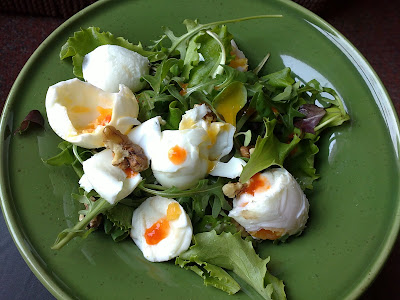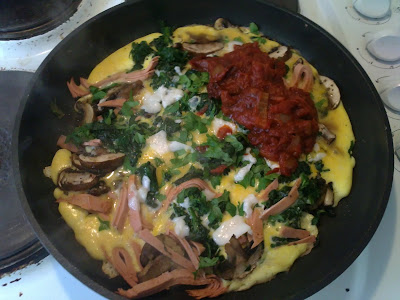Finding a way to manage IBS was actually the reason I started this blog. And over the last few months I've more or less got there. I know there are a lot of people our there who struggle terribly with IBS, so I thought I'd just put it out there what has worked for me, but will just say now that the main thing that worked for me was experimenting, and that what I found that worked mightn't necessarily work for you, but it might be worth trying. Only you can decide that.
The Golden Three
1. First and foremost- get your stress levels sorted. Last year, I didn't really think emotions and stress were involved in my IBS, when any doctor suggested it, I was offended, thinking he/she was suggesting I was a bit flaky, or that it was all in my mind, and I was just making a fus. But I've come to terms with the fact I'm a sensitive soul, and stress does affect my guts. So in the last few months I've made a really conscious effort to get less stressed at work, I don't succeed all the time, but it's a lot better and I'm sure it's made as big a difference as the dietary changes.
2. Don't overeat- especially things like breakfast cereals, chocolate, nut butter, trail mix, or anything beany, like hummus. These foods are often 'moreish' but aren't very nutrient dense, but fairly high in fat and/or carbs and refined at that. If you can't go easy on them, keep them out of the house. For me, the foods I could eat until the cows come home were ice-cream and breakfast cereals. I completely avoid breakfast cereals, and don't even eat sugar free muesli these days, but I do have ice-cream. I avoid overeating it by only buying it by the portion rather than by the pint (or more). Although I adore chocolate, I find it quite easy to limit myself. Instead, have plenty of fruit, vegetables and lean protein- these foods are hard to overeat, you simply get too full. Oh, and don't undereat- it'll probably make you overeat later on anyway, and you're depriving yourself of important vitamins and minerals.
3. Eat slowly. Slow waaay down and chew thoroughly. Nothing is as guaranteed to cause me major discomfort as a rushed meal. If you don't have time to eat slowly, you might need to look at squeezing other constraints on your time instead, because while a skipped meal isn't the end of the world, making time for proper meals will save you so much grief because your IBS will improve drastically. Eat slowly is not just good because your digestive system has less breaking down to do, slower eating also means your stomach has time to tell your head it's full, so you're less likely to overeat as well, which only makes it worse.
And now for the finer points, and the stuff that mightn't necessarily work for you:
Have a good look at the type of carbs you eat- I think this holds the answer to a lot of IBS issues. Personally, I found the idea of cutting out large groups of these sorts of foods too daunting, and it was only really in the last few months that I started to implement all the stuff I'd read about
SCD, paleo diet and
FODMAP diet, even though I'd known about them for nearly a year. It's so worth it- my symptoms are non existent when I'm strict and the little bit on inconvenience and expense is worth it to rid yourself of the bloat, discomfort, gas, constipation and/or diarrhoea. I think these diets are all fairly similar, although I now follow a paleo/primal diet, most of what I eat conforms to the SCD and low FODMAP diet too. I believe we all eat too much sugar, even natural sugar, and far too much starch from grains, and everyone, not just IBS sufferers, should go easy on starchy things. Going primal/paleo is basically the dietary solution I found that keeps me IBS free, but it's not for everyone- it's very reliant on animal protein (basically half animal protein, half plants). That said, I think if you're serious about getting your IBS under control, you need to take low FODMAP/SCD seriously. Cutting out grains, pulses and sugar and uncultured dairy worked for me, but you *will* need to experiment with these things. Even if this all sounds just a bit too much- here's a list of things you should try eliminating (one at a time) for a while to see if it helps- pulses, sugar, grains, dairy.
In a related vein, make sure you're not eating too many harsh fibres. The human gut can handle a fair bit of the stuff, but we don't have the guts of herbivores, so go easy. That doesn't mean you can't be vegetarian and IBS free. Just make sure you're not eating massive salads followed up with a couple of apples and lots of rye bread. I'd also suggest giving a low fibre diet a try for a short while (a month or two) and eating very plainly- mashed potato, cooked oats, skinned apples and pears (gently cooked would be even better), banana, yogurt if you can handle dairy, white rice and very little in the way of high fat foods, pulses, fibrous vegetables or whole grains. It's good way to give your gut a rest. I'm not saying it's a healthy diet, but it's only a temporary 'holiday' for your gut. If you get really constipated, try some ground linseeds, and if that doesn't work, then just start adding fibre back very slowly. I did this under the supervision of a dietician last autumn and it made a huge difference, although at the beginning I was really against it because it seemed so low in fibre and vitamins.
Avoid fried foods- I think trans fat is seriously bad, but it's also really harsh on your guts. Give it up completely- there are always better choices when eating out.
Better still, ditch processed food altogether. Clear your cupboards/larder or manufactured factory foods and keep plenty of whole foods instead. These type of foods require you to chew them more and they're very hard to overeat, they have far higher amounts of vitamin and minerals and you won't be hungry an hour later.
What my diet looks like:
I now eat mostly animal protein (meat, fish eggs), vegetables (either raw or lightly cooked), nuts, seeds, some fruit and fermented dairy. I avoid pulses, grains and most added sugar (I eat 85%+ dark chocolate and ice-cream once or twice a week and honey even less frequently). I eat yogurt, fresh goat's and hard cheese but don't drink milk. I do have a weakness for ice-cream, so treat myself once a week, but it does make me bloated. I'm working on this one- I want to get into the way of making my own frozen yogurt or coconut milk ice-cream.
Breakfast is usually eggs or leftover meat from dinner and some salad leaves, or maybe a spinach and pepper omelette. When I want something lighter I have fruit salad (mostly berries) and some plain yogurt.
I snack mostly on nuts- walnuts and almonds or the odd bit of fruit, but not everyday.
Lunch is a big salad- leaves, grated carrot, pepper, cucumber etc and some sort of protein, usually salmon, hard boiled eggs or cold roast chicken. Dressed with some olive oil and balsamic vinegar.
Dinner almost always has cooked greens (collards, kale, broccoli or cabbage, that sort of thing) and some meat or fish or something like a prawn coconut curry with kale instead of rice. Every now and again I have something a bit starchier, like some mashed turnip or potato/sweet potato in the skin. A lot of primal/paleo/crossfit/bodyrock people have these sort of starches after a workout, and although I usually have these foods on a day I've worked out hard, I don't have them after every hard work out, and my recovery is always fine.
I used to have dessert every.single.evening but that's less frequent now. I might have some frozen berries, a little yogurt, maybe some cocoa powder on it and for a treat, a square of dark chocolate (once or twice a week).
To give you an idea of where I've come from, a typical day's food in my IBS days was more like:
porridge with berries or muesli and soya milk for breakfast, snack of cereal bar, apple or banana, hummus and salad sandwich for lunch, chickpea curry with brown rice for dinner, chocolate soya pudding or fruit crumble for dessert. All pretty 'healthy' food, but really uncomfortable for my gut.
I hope somewhere in this jungle of words there are a few things that will help. In summary I'd say: eat more mindfully, try to overcome comfort eating, sort out your stress levels, and try eliminating pulses, grains, sugar and dairy to see if that helps.
Best of luck!























 The next morning I had another salmon fillet for breakfast with the veggies and ate two small helpings with the tomatoey steak pieces and baked butternut for lunch and dinner. One evening, I had this little helping for supper:
The next morning I had another salmon fillet for breakfast with the veggies and ate two small helpings with the tomatoey steak pieces and baked butternut for lunch and dinner. One evening, I had this little helping for supper: Plain yogurt, frozen blueberries, a sprinkling of nuts and seeds and shredded coconut.
Plain yogurt, frozen blueberries, a sprinkling of nuts and seeds and shredded coconut.
 It's been another hideously busy week in work, so I was glad I had the foresight to do a little prep on Monday. I must get into the habit more often:)
It's been another hideously busy week in work, so I was glad I had the foresight to do a little prep on Monday. I must get into the habit more often:)



























